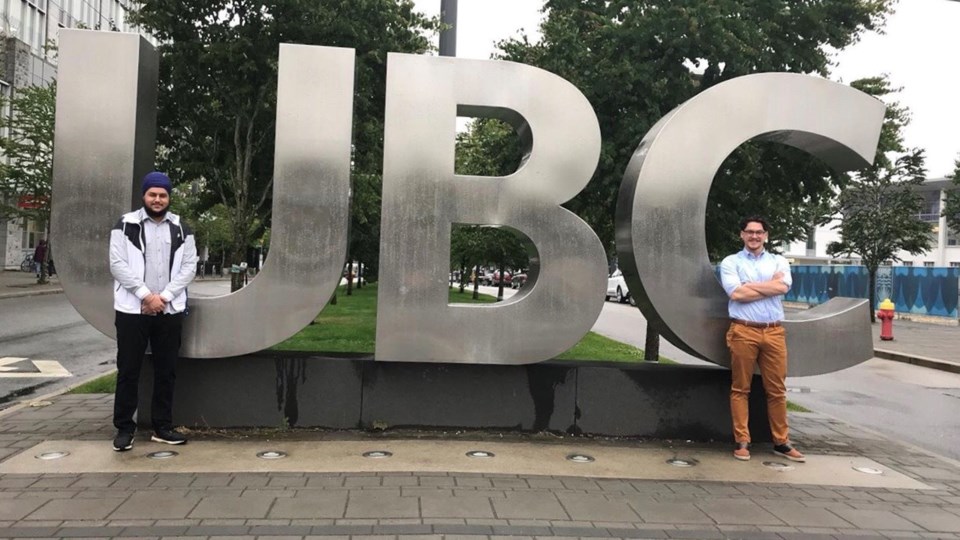Two university students are organizing a charity basketball tournament at the Richmond Oval to help high school students with learning challenges make a successful transition to post-secondary education.
Michael Jakac-Sinclair, a student from Richmond attending Carleton University, teamed up with UBC student Mahtab Singh Gill to organize Hoop to Learn. It’s happening on Tuesday, Aug. 21 from 3:30 p.m. to 8 p.m.
“I’m dyslexic and I felt that not enough light has been shined on this issue,” Jacak-Sinclair said.
Dyslexia is a neurological condition that affects reading comprehension. Kids with the condition may struggle answering questions about a passage they’ve read, but will have no trouble when a passage is read aloud to them.
“There’s a gap between someone’s intellectual ability and what we would call their basic school performance … their ability to read write and do arithmetic,” said Erin Kline, executive director of the Fraser Academy’s outreach centre.
That gap, though, doesn’t mean a student is any less intelligent than one of their peers.
“Your brain isn’t underdeveloped,” Jacak-Sinclair said. “Your brain is just working in a different way.”
Learning how to learn
Jakac-Sinclair was diagnosed in Grade 4, and feels fortunate that his family had the resources to send him to the Fraser Academy, a private Vancouver school that specializes in Orton-Gillingham tutoring for kids with dyslexia. It helps students find different ways they’re able to learn—be it a tactile, auditory or more visual approach.
But he knows other kids aren’t so lucky.
That’s why he’s organizing the basketball tournament for high school kids. Games will be three-on-three with each team allowed one sub. In between the games, they’ll have speakers like Mark Starkey of Vancouver Basketball share how they overcame their own challenges.
The registration fees collected from athletes will be divided in half, with half used for a winner’s purse and half going to the Fraser Academy.
The money will help its new outreach centre it’s opening this year. It will offer after-school tutoring for students whose families may not be able to afford full-time tuition at the specialized school.
The Fraser Academy also hopes to beef up its offerings helping families advocate for their children.
For university students, it offers executive function coaching. It helps students learn to “organize themselves in space and time,” says Kline, to help them budget time to complete a project or complete multiple tasks, like a science lab and then walking to an English class.
Jakac-Sinclair thinks it’s important to raise money for kids whose families couldn’t otherwise afford specialized tutoring or personalized learning plans.
Even getting tested for the conditions can be costly, he says, and students need a diagnosis in order to access support services at most universities.
Going to university with a learning challenge
The transition from high school to post-secondary can be jarring for any student. For those with learning challenges, there’s an added layer of responsibility because they need to reach out to administrators to sort out paperwork for accommodations at every step of the way.
UBC, for example, offers several accommodations like private exam rooms and voice-to-text software. But all require the student reach out to them well in advance.
“We want them to level the playing field so that the disability is not a barrier to them in demonstrating their academic competence,” said Ruth Warick, UBC’s senior accessibility advisor. “We want them to feel welcome in the university environment.”
But even if a student reaches out well in advance for these modifications, it still doesn’t change the fact that a university classroom isn’t always an inviting place for a dyslexic student,
“A lot of university, especially in the first two years, is far more lecture-bound. It necessitates a lot of reading from slides and tends to be a lot less hands-on and less visual,” Kline said. “It doesn’t necessarily lend itself well to being a positive learning environment for dyslexic students.”
Another part of the problem, Jakac-Sinclair thinks, is the stigma surrounding learning disabilities. While no student should feel ashamed to ask for the help they need, he thinks some do.
He remembers his own time in high school participating in Model UN being terrified of making a mistake.
“You feel as if you slip up on a word when you’re reading out loud or if you’re spelling something there’s a pack of wolves ready to pounce on you,” he said. “You have that anxiety built up.”
That’s why he’s also helping to organize another event the day after the basketball tournament. It’s a town hall at the Steveston Community Centre from 5 to 7 p.m.
He thinks that simply learning more about one’s learning challenge, meeting peers facing similar issues and feeling accepted can go a long way toward success in school.
“We realized that the intersectional traits of this issue are deeper. It goes into mental health, cost of living, one’s social life,” he said.
Through the basketball tournament and outreach at the town hall, they’re hoping to raise awareness and funds for services for dyslexic students that can help them succeed in university.
“Dyslexic students are so bright,” Kline said. “They are innovative thinkers and to see the world in a bit of a different way. They have the brains that are needed to solve the world’s current problems.”



